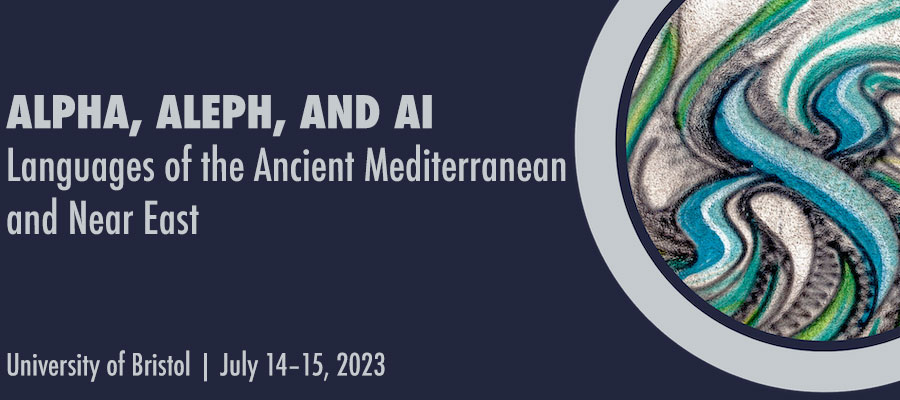Alpha, Aleph, and AI: Languages of the Ancient Mediterranean and Near East, University of Bristol, July 14–15, 2023
This two-day conference, generously funded by the Institute of Greece, Rome and the Classical Tradition, aims to bring together researchers and postgraduates working in historical linguistics, philology, textual criticism, manuscript studies, and applications of AI and Digital Humanities for languages and textual criticism, within the cultures of the ancient Mediterranean and Near East. Envisaged languages and textual corpora within this scope include, but are not limited to: Greek, Latin, Hebrew, Aramaic, Syriac, demotic, Coptic, Nabatean, Safaitic, Arabic, and Akkadian.
Classicists, Biblicists, palaeographers, papyrologists, epigraphers, and ancient historians all have a range of analogue and digital tools for research, learning, and publishing. Some prominent examples include papyri.info, Trismegistos, Classical Text Editor, EpiDoc XML, Accordance bible software, and Packard Humanities Institute epigraphy. Specialised databases, search engines, software, and digitisation offerings are now widely available. With the advent of machine learning, and years of trial and error, digital- and data-driven applications are starting to come of age in both purpose and usefulness. However, it is not a necessity or expectation of this conference that all speakers are required to have a digital element to their research. Rather, we aim to bring together those working primarily in ancient Mediterranean and Near Eastern studies and those working in or exploring digital and AI applications.
The conference has two main objectives: 1) to showcase research in historical linguistics, philology, and textual studies involving languages to some extent, of the ancient Mediterranean and Near East, especially with a comparative element, and 2) to foster networks and new, innovative or digital approaches to historical linguistics and texts within this scope. Four keynote speakers will help orient themes and discussions, and a roundtable of PGRs and ECRs will close the conference.
Encouraged topics
- Linguistic, philological, lexicographic, and/or text-critical studies in Mediterranean and Near Eastern antiquity, especially with a comparative element.
- Digital, Digital Humanities, machine learning (AI), FAIR, Open Data, VR, and other data- driven or computing-driven approaches to ancient languages and/or ancient textual corpora in Mediterranean and Near Eastern antiquity, including historical linguistics, philology, textual criticism, corpus linguistics, lexicology, scribal culture, multilingual texts, ancient translations, textual corpora, etc. This might include innovative methods of digitisation, mapping and analysing ancient linguistic data, orthography, language change, or textual corpora, e.g. machine learning/AI, computational modelling, OCR, natural language processing, corpus linguistics, etc.
- Manuscript, papyrological, epigraphic, and scribal culture studies in Mediterranean and Near Eastern antiquity.
- Comparative Semitics studies.
- Comparative Greek-Latin or comparative Indo-European studies.
- Translation and transmission studies, either/both within ancient and classical texts and translations, e.g. Septuagint and cognate texts, but broadly speaking any texts transmitted over time, or texts preserved in more than one language.
- Multilingualism and bilingualism, language choice, or language change in ancient Mediterranean and Near Eastern communities, texts, and documents.
